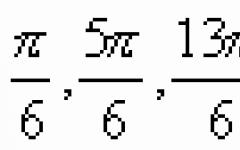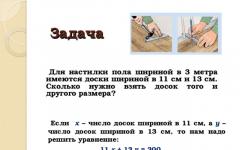1. Addition- This minor member sentences that mean item:
- the object to which the action applies;
I am writing a letter; I listen to music.
- object - the addressee of the action;
I am writing to a friend.
- object - an instrument or means of action;
I write with a pen.
- the object to which the state applies;
I'm upset.
- object of comparison, etc.
Faster than me.
2. The supplement answers questions indirect cases:
- genitive case - whom? what?
Choosing a profession.
- dative case - to whom? what?
I am writing to a friend.
- accusative case - whom? What?
I am writing a letter.
- instrumental case - by whom? how?
I write with a pen.
- prepositional case - about whom? about what?
I'm thinking about a friend.
3. The addition may refer to:
- predicate verb;
I am writing a letter.
- the main or minor member expressed by a noun;
Loss of a horse; hope for happiness.
- the main or minor member, expressed by an adjective or participle;
Strict towards children; thinking about children.
- the main or minor member, expressed by an adverb.
Unnoticed by others.
Ways to express complement
Notes
1) Combinations are a single member of a sentence - an addition in the same cases in which combinations - subjects are a single member (see paragraph 1.2).
2) The infinitive of a conjugated verb is an addition, and not the main part of the predicate, if its action refers to a secondary member ( I asked him to leave), and not to the subject ( I decided to leave). Detailed analysis For such cases, see clause 1.4.
3) Since questions and forms of the nominative and accusative cases, accusative and genitive cases can coincide, to distinguish between the subject and the object, use the technique discussed in paragraph 1.2: replace the form being checked with the word book(nominative case - book; genitive case - books; accusative case - book. For example: A good snowball will reap the harvest(cf.: Good book will collect the book). Hence, snowball- nominative case; harvest- accusative case).
4. Based on the form of expression, there are two types of additions:
direct addition - accusative case form without preposition;
I'm writing(What?) letter; I wash(What?) linen; I'm listening(What?) music.
indirect addition - all other forms, including the accusative case with a preposition.
Struggle(for what?) for freedom; gave(to whom?) to me .
Notes
1) In negative sentences, the accusative case form of the direct object can change to the genitive case form (cf.: I wrote(What?) letter . - I didn't write (what?) letters). If the genitive case form of a complement is preserved both in affirmation and in negation, then such a complement is indirect (cf.: To me not enough (what?) money - I have enough(what?) money).
2) The object expressed by the infinitive does not have a case form ( I asked him to leave). Therefore, such additions are not characterized as either direct or indirect.
Addition analysis plan
- Specify the type of addition (direct - indirect).
- Indicate what morphological form the addition is expressed in.
Sample parsing
I ask you to speak to the point(M. Gorky).
You- direct object expressed by a pronoun in the accusative case without a preposition. Speak- an addition expressed by an infinitive. Affairs- an indirect object expressed by a noun in the genitive case.
The night did not bring coolness(A.N. Tolstoy).
Coolness- direct object expressed by a noun in the genitive case without a preposition (if negated - didn't bring it ). Wed: The night brought(What?) coolness(V.p.).
At transitive verbs with negation, in some cases the use of the genitive case of the complement clearly predominates, in others - the use of the accusative case, in others - their optional use is observed.
Genitive case, which in the construction under consideration has the meaning of an underlined negation, is usually used in the following cases:
if there is a particle in the sentence neither or starting with a particle neither pronouns or adverbs, for example: Yes we arewe have no idea about what is happening to these unfortunate people...(L. Tolstoy); Never still hedidn't feel so sad about your defenselessness, your powerlessness(Bitter); Up to younobody also this braceletdidn't wear it (Kuprin); ... Doesn't make it any easier reading process(Academician F.F. Fortunatov);
with a dividing-quantitative value of the addition, for example: ... Don't give whetherwater ?; I tell youI won't get bread ... You won't drink milk on the road?; At lunch it turned out that hedoesn't drink wine Anddoesn't eat meat (all examples from Gorky); Didn't buy for teasteering wheel (Fedin);
with verbs of perception, thought, desire, expectation ( see, hear, understand, think, know, want, desire, expect etc.), for example: Sorrow in her words Samghinhaven't heard (Bitter); He... villagesdidn't know (Chekhov); Styopka swallowed... sweets and evendidn't notice their taste(V. Grossman);
with verbs have, get, get etc., which in combination with a particle Not take on the meaning of complete negation, for example: doesn't have rooms,didn't receive order,didn't get it ticket,did not purchase necessary things;
when expressing complements with abstract nouns: doesn't give reasonsdoesn't detect understanding,doesn't lose hope,doesn't hide joy, joydoes not implement control,doesn't miss case,doesn't concessions. For example: There's noise heredon't like (Bitter); I'm having funnot looking (V. Ketlinskaya); Morningdidn't bring clarity(Leonov);
in stable combinations, proverbs, sayings, more often when expressing a complement with an abstract noun, for example: does not feel desire, does not have hope, does not find support, does not make a secret, does not give way, does not dote on the soul, does not take part, does not pay attention, does not give peace, has no idea, does not inspire confidence, does not miss an opportunity; You can’t turn back yesterday; Don't trust someone else's secrets. Also, with a specific meaning of a noun: does not take his eyes off, tirelessly; Chickens don't eat money; You can't get bread by lying; You can't break a butt with a whip; You can't bite your elbow; Murder will out;
with a gerund or participle, due to the bookish nature of these forms, for example: Not received answer, the old man goes to the station(Chekhov); ... Suddenly they diewithout finishing poems(Simonov);
in infinitive sentences that emphasize the categorical nature of the negation, for example: Can't catch up you have a crazy threesome... (Nekrasov); When troops pass, no one windowsdon't open ... (V. Vishnevsky).
Accusative case, weakening the meaning of negation, is usually used in the following cases:
when pointing to a specific object (“exactly this object, and not just any other object”): not reviewed the manuscript that was sent to him;didn't drink milk that her mother left her. For example: Hedidn't reject then with contempt these hundred rubles(Dostoevsky); Don't tilt the banner... (Bitter);
when expressing a complement with an animate noun, in particular a person’s own name, for example: Youdon't like mother(L. Tolstoy); ... Won't regret it neither dad nor mom(Bitter); Anna Nikolaevnadidn't deceive Marya Alexandrovna... (Dostoevsky); Malaisenever left Kozma still has a long time to come(Bunin).
The same applies to toponyms, since they are also thought of as specific, well-defined concepts, for example: Don't give up Port Arthur... (Bitter).
Optional the use of the genitive and accusative case with a transitive verb with negation is associated with a stylistic difference: constructions with genitive case characteristic of book speech, constructions with the accusative case - for colloquial speech. Wed: II'm not belittling someone's merits... (Bitter). – That's how you diewithout speaking this word(aka).
For verbs with a prefix under-, which does not have the meaning of negation, but indicates the performance of an action below the norm, the addition is usually put in the form of the accusative case, for example: underload a ton coal,not deliver mail, fill up the glass, underestimate strength enemyunderbake the pie, underfulfill the plan; The genitive case in these cases is used for the quantitative and dividing meaning of the object, for example: not enough parts, not enough oil, not enough bricks, not enough water, not enough money.
The placement of a direct object in the form of the accusative case is mandatory in cases where the negation “not” does not appear with a transitive verb, but with another word in the sentence, for example: Not quiteUnderstood exercise,Not VeryI love painting,Not oftenI'm reading fiction.
10. Between the subject and the nominal predicate in place of the missing connective a dash is added, if the subject and predicate are expressed as nouns in the nominative case: The outbuilding near the house on Sadovaya, designed by Mikhail Aleksandrovich Vrubel, is the only building from the Mamontovs’ possessions that has almost preserved its appearance to this day(Keys); Pushkinsky region - the land of stones(Gaych.); This portrait is the only picturesque image of the daughter of Anna Petrovna Kern(Gaych.); ...My ability to keep the past to myself is a hereditary trait(Eb.); And the woman leaning over the fence is your second cousin(Shcherb.).
Note. A dash may not be placed if the written speech reflects pronunciation with logical emphasis on the predicate: My sister teacher (cf.: My sister is a teacher - emphasis on the word sister, and in word teacher). The dash is required: 1) if there is a comparison: My sister is a teacher and my brother is a livestock specialist; 2) if syntactic or semantic ambiguity is possible; compare: Brother is my teacher And My brother is a teacher .
11. A dash is placed before the predicate, attached to the subject by words here it is: “Respect for the past - that's the line“that distinguishes education from savagery,” Pushkin once said(Spread); Pushkinogorye – this is not only a monument historical-literary, This and a peculiar botanical and zoological garden, a wonderful natural monument(Gaych.). As a link, a combination is also possible it is: Hypotenuse – this is the side right triangle, opposite right angle (from the textbook).
12. A dash is placed when expressing both the subject and the predicate (or only the subject, or only the predicate) with an infinitive: In this city know three languages are an unnecessary luxury(Ch.); An incomparable feeling - hear their[rooks] for the first time after six months of winter death!(Boon.). The presence of negation does not remove the sign: Tea drink - not firewood chop (last); Life live- not a field go (last). The same if the predicate contains words this means: Wait for permission - Means waste time(gas.); Leave the institute now - this means lose everything(gas.); And to understand a person - Means already sympathize with him(Shuksh.).
13. A dash is placed between the subject and the predicate, if they are expressed by numerals (or a phrase with a numeral), and also if one of the main members of the sentence is expressed by a numeral: So, nine forty - three hundred sixty, So?(Peace); The depth there from the boat is four flywheels, that is six meters(Shol.).
Note. In specialized literature, it is not customary to use a dash when indicating a numeral number: The mass of such a rangefinder 23 kg; Maximum range of the laser locator in question 10 km .
In the case of using the particle not before the predicate-numeral (compare the same when expressing the predicate with a noun,
15, paragraph 3) there is no dash: A man can, for example, say that twice is two not four, and five or three and a half; and the woman will say that twice is two - a stearin candle(T.).
14. A dash is placed with a predicate expressed by a phraseological turn: Pie - you'll lick your fingers; He has talent - God bless everyone; The mother shed tears of joy, and the father at least something! (Cool.); Hut – so-so, barn(Shuksh.); Efim himself - don't put your finger in your mouth (Shuksh.); And Victor - neither father nor mother (Cool.); Night - at least poke out your eyes! (A. Color.).
The presence of the particle not, as well as introductory words for stable combinations in the role of a predicate, prevents the placement of a dash (but does not prohibit): This officer no match for you, Mister Gendarme(Fed.); We have him as a scientist, and plays the violin, and cuts out various things, in a word, a jack of all trades (Ch.).
15. Dash between subject and nominal predicate not placed :
1. If the subject is expressed by a personal or demonstrative pronoun: She his daughter. He wants to understand her(Shcherb.); This cabinet? This bedroom?(Ch.)
Note. A dash is possible: a) if the entire sentence contains a question accompanied by surprise: Is she his daughter?!(both members of the sentence are stressed); b) when underlining the indication of a given item: This is an office (And this is the office); c) when contrasted: I am a teacher and you are an engineer .
2. If one of the main members is expressed by an interrogative pronoun, and the other by a noun or personal pronoun: Who your defender? What is studying? Who she?
3. If the predicate noun has a negation: Scenery not an appendage to prose and not a decoration (Paust.); Russia not St. Petersburg, she's huge(Priv.); Old age not joy (last). However, when contrasting a predicate with a negation, it requires a dash (not... a): And at the same time he noticed that he was not the master in his house, but only component his(M. G.) (cf. without contrast: He is not the master of his house).
4. If the predicate is expressed by an adjective or participle: And your room so good for a child(Ch.); I have a lot of good people, almost all of them good (Sim.); He had two wounds. Wounds easy, but the man lost a lot of blood(Paust.); Log house pink, peeling, small, rustic, covered with a green iron roof (Kav.); harsh autumn sad late view(Sick.); There's a feast in the dining room hot And ardent (Sick.).
However, with a predicate-adjective, a dash is placed when there is structural parallelism of parts of the sentence, accompanied in oral speech by intonation emphasis (emphasis) on both members of the sentence: Everything in her appearance attracted attention: sight - spicy, hairstyle – boyish, cloth - modern, fashionable ; Wed with emphasis on only the predicate: Weather obnoxious, road nasty, coachman stubborn, the horses don't carry, and the caretaker is to blame(P.). A dash is also possible in the presence of several (homogeneous) predicates: Her son is yellow, long and with glasses (M.G.).
5. If the predicate is expressed in a phrase with comparative particles like, as if, what, exactly, sort of like etc.: Life like a legend; Sky like a pitched tent; Brooch kind of like a bee (Ch.); Forest exactly a fairy tale; Week that one day. Passes quickly; Pond like shiny steel (Fet). A dash is not placed when introducing a predicate that lexically coincides with the subject: Ice z015_01, deserts like deserts (Kav.); Village like a village; House like a house- old, dark(Shuksh.).
Note. When emphasizing the predicate (usually for stylistic purposes), a dash is possible: This lonely and perhaps completely random shot - like a signal (Furm.); His mouth is bitter from tobacco-samosad, his head is like a weight(Shol.); Blackening glades - like black islands in a white snowy sea (Boon.); Milky Way – like a big society (B. Past.); Moon in the sky - like Central Asian melon (Current.).
6. If between the subject and the predicate noun there is introductory word, adverbial or complement, as well as conjunction or particle: Rook, Certainly, the bird is smart and independent, but he has no voice(Paust.); My father for me friend and mentor; Moscow Now port of five seas; My brother Same engineer; This stream only beginning of the river .
There is no dash between the subject and the nominal predicate:
1. If the subject is expressed by a personal or demonstrative pronoun: She his daughter. He wants to understand her(Shcherb.); Is this an office? Is this a bedroom? (Ch.)
Note. A dash is possible: a) if the entire sentence contains a question accompanied by surprise: Is she his daughter?!(both members of the sentence are stressed); b) when underlining the indication of a given item: This is an office (And this is the office); c) when contrasted: I am a teacher and you are an engineer.
2. If one of the main members is expressed by an interrogative pronoun, and the other by a noun or personal pronoun: Who is your protector? What is study? Who is she?
3. If the predicate-noun has a negation: Landscape not an add-on to prose and not a decoration(Paust.); Russia is not St. Petersburg, it is huge (Prishv.); Old age is not joy (last). However, when contrasting a predicate with a negation, a dash is required (not... a): And at the same time he noticed that he was not the master in his house, but only an integral part of it(M. G.) (cf. without contrast: He is not the master of his house).
4. If the predicate is expressed by an adjective or participle: And your room is so good for a child (Ch.); I have a lot of good ones people, almost all good(Sim.); He had two wounds. Wounds easy , but the man lost a lot of blood(Paust.); Log house pink, peeling, small, rustic, covered with a green iron roof(Kav.); In the harsh autumn the late appearance is sad (Sick); In the dining room the feast is hot and ardent (Sick).
However, with a predicate-adjective, a dash is placed when there is structural parallelism of parts of the sentence, accompanied in oral speech by intonation (emphasis) of both members of the sentence: Everything in her appearance attracted attention: the look - sharp, hairstyle - boyish, clothes - modern, fashionable; Wed with emphasis on only the predicate: The weather is unbearable, the road is bad, the driver is stubborn , the horses don't carry, and the caretaker is to blame(P.). A dash is also possible in the presence of several (homogeneous) predicates: Her son is yellow, long and with glasses(M.G.).
5. If the predicate is expressed in a phrase with comparative particles like, as if, what, exactly, sort of like etc.: Life like a legend; Sky like a pitched tent; Brooch kind of like a bee(Ch.); The forest is definitely a fairy tale; A week is like one day . Passes quickly; Pondlike shiny steel(Fet). A dash is also not placed when introducing a predicate that lexically coincides with the subject: Ice like ice, deserts like deserts (Kav.); A village is like a village; A house is like a house - old, dark(Shuksh.).
Note. When emphasizing the predicate (usually for stylistic purposes), a dash is possible: This lonely and perhaps completely random shot -like a signal(Furm.); His mouth is bitter from tobacco-samosad, his head islike a weight(Shol.); Blackening glades -like black islands in a white snowy sea(Boon.); Milky Way -like a big society(B. Past.); Moon in the sky -like Central Asian melon(Current.).
6. If between the subject and the predicate noun there is an introductory word, circumstance or addition, as well as a conjunction or particle: Rook, of course , the bird is smart and independent, but he has no voice(Paust.); My father for me friend and mentor; Moscow Now port of five seas; My brother Same engineer; This stream just the beginning of the river.
1. A dash is placed between the subject and the predicate in the absence connectives, if both main members of the sentence are expressed nouns in nominative case ,
For example: Moscow is the capital of Russia. The gathering place is the parade ground (Sholokhov).
As a rule, a dash is placed:
1) in sentences that have the nature of a logical definition ,
For example: Geology is the science of the structure, composition, history of the earth's crust;
2) in sentences of a scientific or journalistic style containing a characteristic, assessment of an object or phenomenon,
For example: Life is a special form of movement of matter that arises at a certain stage of its development;
3) after homogeneous subjects,
For example: Flattery and cowardice are the worst vices (Turgenev); Space and time are the basic forms of all existence;
4) to clarify the meaning of a sentence;
compare: The elder brother is my teacher; My elder brother is a teacher.
A dash is usually not placed, although the subject and predicate are expressed in the nominative case of the noun:
A) in simple sentences conversational style speeches,
For example: My sister is a student;
b) if there are comparative conjunctions between the subject and the predicate as if, as if, exactly, all the same, all the same, kind of like etc.,
For example: Pond like shiny steel (Fet); You are like a white dove among sisters among gray, simple pigeons (Nekrasov); Your brooch looks like a bee (Chekhov); The houses of the city are like piles of dirty snow (Gorky).
Deviations from this rule are associated with the author’s desire to emphasize the connotation of comparison contained in the predicate,
For example: Silence is like a piece of ice, you can break it further with a whisper (Leonov); Your speeches are like a sharp knife... (Lermontov); ...Such a phrase is like a grand helmet in a jumbled mess (Turgenev);
V) if the predicate is preceded by a negation Not,
For example: This officer is no match for you... (Fedin); Analogy is not proof. Compare proverbs and sayings: The word is not a sparrow: if it flies out, you won’t catch it; Poverty is not a vice; The heart is not a stone.
But a dash is placed if it aims to logically and intonationally emphasize the predicate,
For example: But an explanation is not an excuse (Gorky); “Human blood is not water” (Stelmakh); Living life is not a field to cross (proverb);
G) if between the subject and the predicate there is an introductory word, adverb, conjunction, particle,
For example: ...The goose is known to be an important and sensible bird (Turgenev).
Compare the presence or absence of a dash depending on the specified conditions:
Cotton is the most important industrial crop. – Cotton, as is known, is the most important industrial crop (an introductory combination has been inserted).
Cinema is the most popular art form. – Cinema is still the most popular form of art (adverb inserted).
Kok-sagyz is a rubber plant. – Kok-sagyz is also a rubber planter (a conjunction is inserted).
December is the beginning of winter. – December is just the beginning of winter (particle inserted);
d) if the predicate is preceded by an inconsistent minor member related to itoffers,
For example: Stepan is our neighbor... (Sholokhov);
e) if the predicate precedes the subject,
For example: A wonderful person, Ivan Ivanovich! (Gogol).
The placement of a dash in this case emphasizes the intonational division of the sentence into two compounds,
For example: Nice people are my neighbors! (Nekrasov); Good side- Siberia! (Bitter); Psychological curiosity - my mother (Chekhov);
b) if the subject in combination with the predicate forms an indecomposable phraseological phrase,
For example: A theory that fixes only patterns is worthless (S. Golubov).
2. A dash is placed between the subject and the predicate if both of them are expressed by the indefinite form of the verb or if one of the main members of the sentence is expressed by the nominative case of the noun, and the other by the indefinite form of the verb.
For example: To teach a scientist is only to spoil him (proverb); Our duty is to defend the fortress until our last breath... (Pushkin).
3. A dash is placed before the words this, this is, this means, this means, adding the predicate to the subject.
For example: The Kremlin is a treasury of Russian architecture, the creation of great masters, living chronicle centuries-old history (From newspapers). All the past, present and future are us, and not the blind force of the elements (Gorky).
Compare: The most late autumn- this is when the rowan shrivels from frost and becomes, as they say, “sweet” (Prishvin)(the whole sentence acts as the predicate).
4. A dash is placed if both main members of the sentence are expressed by the nominative case of a cardinal numeral or if one of them is expressed by the nominative case of a noun, and the other by a numeral or a phrase with a numeral.
For example: So, nine forty is three hundred and sixty, right? (Pisemsky); Ursa Major - seven bright stars; The specific gravity of gold is 19.3 g/cm3.
In specialized literature, when characterizing an object, a dash is often not placed in this case, for example, the melting point of gold is 1064.4?; The crane's lifting capacity is 2.5 tons, boom clearance is 5 m.
5. A dash is placed between the subject, expressed by the infinitive form of the verb, and the predicate, expressed by the predicative adverb ending in -o, if there is a pause between the main members of the sentence,
For example: Preparing for exams is not so easy (Fedin); Giving in is shameful (V. Tendryakov); It’s very unbearable to move (Goncharov).
But (in the absence of a pause): It is very easy to judge a person in disgrace (L. Tolstoy).
6. A dash is placed before the predicate, expressed phraseological phrase,
For example: Both a woman and a man are a pair of nickels (Chekhov); And the porch - God forbid another prince... (A.N. Tolstoy).
7. With a subject expressed by the pronoun this, a dash is placed or not depending on the logical selection of the subject and the presence or absence of a pause after it.
Compare:
A) This is the beginning of all beginnings; This is the actress's first performance; This is loneliness (Chekhov);
b) This is the house of Zverkov (Gogol); This is a net for catching quails (Chekhov); This is a very difficult problem.
8. A dash is usually not placed if the subject is expressed by a personal pronoun and the predicate by the nominative case of the noun,
For example: ...I am an honest person and never give compliments (Chekhov); I am terribly glad that you are my brother (L. Tolstoy); He is corruption, he is the plague, he is the plague of these places (Krylov).
In this case, a dash is placed when contrasting or when logically emphasizing the predicate,
For example: You - old baby, a theorist, and I am a young old man and a practitioner... (Chekhov); I am a manufacturer, you are a shipowner... (Gorky); Not I, not I, but you are the harmful element (Fedin).
9. A dash is not placed if one of the main members of the sentence is expressed by an interrogative-relative pronoun, and the other by a noun in the nominative case or a personal pronoun,
For example: Tell me who your friend is and I will tell you who you are.
10. As a rule, a dash is not placed if the predicate is expressed by an adjective, pronominal adjective, or prepositional-nominal combination.
For example: She has a very kind heart, but a bad head (Turgenev); My cherry orchard! (Chekhov). The shark’s back is dark blue, and its belly is dazzling white (Goncharov).
Placing a dash in these cases aims to break down the sentence intonationally and facilitate the perception of its content,
For example: The pupils are cat-like, long... (Sholokhov); The height near the scattered houses of the farm is commanding... (Kazakevich).
11. In footnotes, a dash separates the word being explained from the explanation, regardless of the form of expression of the predicate.
For example: Lakshmi is the goddess of beauty and wealth in Indian mythology; Apis is considered a sacred animal by the ancient Egyptians.







